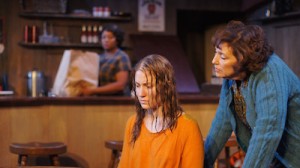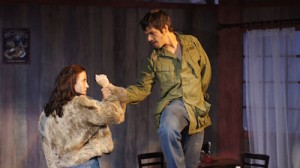Dramedy very infrequently serves its stories well. Add to that alloy the well-worn narrative of an unfolding mystery, and one can easily overflow an already full cup. But Sea of Souls is an adamant proponent of such a mixing, so long as they can evoke every audience emotion from terror to laughter. Souls has a swift undercurrent of drama, cast over with ostensible shades of black comedy, all of which crashes together in a series of messy, heart-thumping climaxes. Ion Theater Company's presentation of this Southern-accented, surprisingly action-packed new play, has traveled across the country from it's home in San Diego to an off-Broadway reading at the Peter Jay Sharp Theater.
The play is like Picnic, in that its characters struggle to bury themselves under tough, yet brittle, exposures, and then it takes on something of a Tennessee Williams-like series of haunting personal revelations. Set in an unnamed mining town in the South, sometime in the late sixties, suspicions abound when a wandering folk singer from New York arrives at the town's bar (mysteriously named Sea of Souls—the acronymized cry for help is the production's first big clue to its audience) and won't stop asking about where she's from. When she clashes with Casey, the bar's bitter, sharp-tongued owner, Sam proceeds to uncover a series of clues about the small town's unsavory past.
Perhaps Souls' greatest offering is the formidable Catalina Maynard, whose uncompromising, biting portrayal of the lead character Casey grounds the entire production. Casey's sharp tongue lashes out indiscriminately, and her stiff social graces provide everything from mild comic relief to extraordinarily fierce dramatics. Ms. Maynard's performance elevates Casey's character to that elusive kind of antihero likability, and few middle-aged matriarchs on stage can achieve that. With the potency of Ms. Maynard's presence, the other characters play up to her (with a singular exception), sometimes with affecting results.
Abby Fields as the aptly-named Joan is the beguiling mystery at the heart of the play. She starts out as the mildly irritating moral center of Souls (she introduces herself by staring eerily at us and saying, prophet-like, "I know things. I have a gift.") But quickly, and quite beautifully, she evolves into a haunting symbol of her small town's deadly past, and it is in this transformation that we find Ms. Fields' strength as a character performer. Her powerful presence on stage is only rivaled perhaps by Ms. Maynard and Evan Jason Heil, the "new-in-town" deputy sheriff Roy whose aw shucks persona has no end to its audience appeal.
Carl, the mischievous runaway and disillusioned Nam vet, is infected with a Kerouacian wanderlust typical to the sixties. Evan Kendig plays him with an endearing earnestness; it is easier to love the roguish Carl that it is to find commonality with the wandering Sam, played by the sometimes-interesting Rhianna Basore. Sam is something of a blank slate, and it is unclear if Ms. Basore meant to play her that way, or if it is an unforeseen consequence of an occasionally vacant performance. Carl and Sam are the thematic opposites to the dwellers of Souls' small town setting; Casey sets up a unique tension with the "Northerner" Sam who walks into her bar, bristling at the assumptions the former makes about her Southern hometown. Yolanda Franklin is delightful as Lila, the fast-talking foil to Casey's wrath and rage. Ms. Franklin portrays her with delicate intensity, as the only person who can control Casey's lashing tongue. Their banter seems a product of an eons-long friendship-turned-symbiosis, and provides a priming, emotional depth to Souls.
In particular credit to the script and its writers, Glenn Paris and Claudio Raygoza, the dialogue manages to synthesize the nearness of an emotional apocalypse that every character on stage seems to be running from: Vietnam, spousal abuse, past murders, an abandoned child. Paris and Raygoza, also artistic directors, are keenly aware of their time period, and dress up speeches and arguments with the colloquialisms of that volatile time, the sixties. The characters take up an inherent residence in the cultural and political fabric of America in the sixties, yet never leave the diner tables and bar stools of their small Southern town.
The mood of the production alternates seamlessly between sombre remembrances of said town's past, and the brisk diurnal rituals of 'good mornings' and humorous exchanges. The set itself beams with bright oranges, yellows and greens - overhead lamps glisten redly above the bar, and a colored jukebox sings soft folktales between scene changes (songs which happen to be original compositions by the sultry-voiced, and hugely talented, Linda Libby.) Most of the climaxes that clutter the ending (for there are multiple) take place in the dark, and more than one audience member shuddered at the bloodcurdling screams and bangs that suddenly reminded us that we were done laughing at Casey's sarcasm or trying to work out Sam's sorrowful origin story. Sea of Souls isn't realized fully until the explosive ending(s), but that's a good thing - it builds its mysterious stamina over time and sprints to a breathtaking finish.
Sea of Souls ran until July 11 at Peter Jay Sharp Theater (416 West 42nd Street) in Manhattan. For more information, visit http://iontheatre.com/#ion-home-page.








